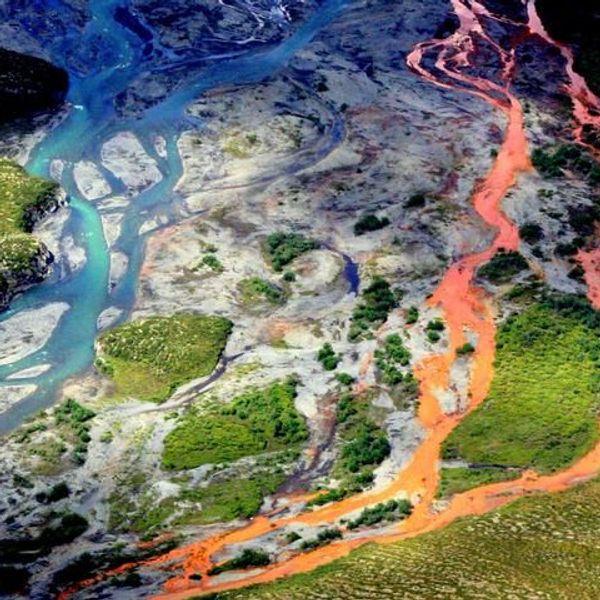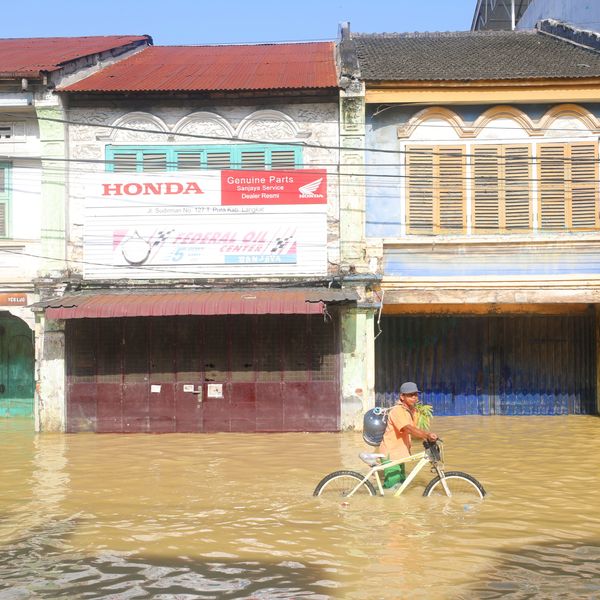On Hotter Planet, Expect More Weather Extremes, say Reports
While new data reveals 2013 as one of the hottest, climate experts call for global action
Two new reports released amid the UN climate talks in Warsaw this week show that weather extremes are only on the rise and that those facing the most dire consequences are the countries that have contributed least to climate change.
Don't expect weather extremes to peter out anytime soon, warned the UN World Meteorological Organization Secretary-General Michel Jarraud Wednesday, citing the release of a new report showing that this year has been one of the warmest on record and global sea levels have reached an all-time high.
"This year once again continues the underlying, long-term trend," towards higher temperatures and sea-level rise, said Jarraud. The year now ranks as the seventh hottest since records began in 1850.
While ice caps continue to melt and sea levels creep higher, low-lying coastal regions such as those devastated over the weekend by Super Typhoon Haiyan, are ever more susceptible to disaster, Jarraud said.
"Although individual tropical cyclones cannot be directly attributed to climate change, higher sea levels are already making coastal populations more vulnerable to storm surges. We saw this with tragic consequences in the Philippines," he said.
Jarraud continued:
Sea levels will continue to rise because of melting ice caps and glaciers. More than 90 percent of the extra heat we are generating from greenhouse gas is absorbed by the oceans, which will consequently continue to warm and expand for hundreds of years.
According to the report, the current average sea-level rise is double that of the 20th-century.
However, in the Philippines sea levels have averaged four times the global rate.
The WMO report follows a study released Tuesday, also in Warsaw, which lists the countries most affected by these increasingly severe weather events--with Haiti, the Philippines and Pakistan at the top of the list.
The Global Climate Risk Index 2014 released by Germanwatch highlights that "less developed countries are generally more affected than industrialized countries," a topic of contention at the Warsaw climate talks as developed countries such as the U.S. are once again trying to evade fiscal and social responsibility.
"These are the countries that have contributed least to climate change because they have tiny emissions, yet they are the countries that are suffering most from it," said Christoph Bals, policy director of Germanwatch. "Developed countries that have caused the problem have a moral responsibility to help."
"The climate summit 2013 held in Warsaw, Poland, is a defining moment and should mark a turning point for the international community by starting immediately to scale-up its response in addressing climate change and the increasing loss and damage," the Index states. "The window of time to put the world on track to stay below the 2degC guardrail is closing rapidly, and Warsaw must trigger new dynamics."
_____________________
An Urgent Message From Our Co-Founder
Dear Common Dreams reader, The U.S. is on a fast track to authoritarianism like nothing I've ever seen. Meanwhile, corporate news outlets are utterly capitulating to Trump, twisting their coverage to avoid drawing his ire while lining up to stuff cash in his pockets. That's why I believe that Common Dreams is doing the best and most consequential reporting that we've ever done. Our small but mighty team is a progressive reporting powerhouse, covering the news every day that the corporate media never will. Our mission has always been simple: To inform. To inspire. And to ignite change for the common good. Now here's the key piece that I want all our readers to understand: None of this would be possible without your financial support. That's not just some fundraising cliche. It's the absolute and literal truth. We don't accept corporate advertising and never will. We don't have a paywall because we don't think people should be blocked from critical news based on their ability to pay. Everything we do is funded by the donations of readers like you. Will you donate now to help power the nonprofit, independent reporting of Common Dreams? Thank you for being a vital member of our community. Together, we can keep independent journalism alive when it’s needed most. - Craig Brown, Co-founder |
Jacob Chamberlain is a former staff writer for Common Dreams. He is the author of Migrant Justice in the Age of Removal. His website is www.jacobpchamberlain.com.
Two new reports released amid the UN climate talks in Warsaw this week show that weather extremes are only on the rise and that those facing the most dire consequences are the countries that have contributed least to climate change.
Don't expect weather extremes to peter out anytime soon, warned the UN World Meteorological Organization Secretary-General Michel Jarraud Wednesday, citing the release of a new report showing that this year has been one of the warmest on record and global sea levels have reached an all-time high.
"This year once again continues the underlying, long-term trend," towards higher temperatures and sea-level rise, said Jarraud. The year now ranks as the seventh hottest since records began in 1850.
While ice caps continue to melt and sea levels creep higher, low-lying coastal regions such as those devastated over the weekend by Super Typhoon Haiyan, are ever more susceptible to disaster, Jarraud said.
"Although individual tropical cyclones cannot be directly attributed to climate change, higher sea levels are already making coastal populations more vulnerable to storm surges. We saw this with tragic consequences in the Philippines," he said.
Jarraud continued:
Sea levels will continue to rise because of melting ice caps and glaciers. More than 90 percent of the extra heat we are generating from greenhouse gas is absorbed by the oceans, which will consequently continue to warm and expand for hundreds of years.
According to the report, the current average sea-level rise is double that of the 20th-century.
However, in the Philippines sea levels have averaged four times the global rate.
The WMO report follows a study released Tuesday, also in Warsaw, which lists the countries most affected by these increasingly severe weather events--with Haiti, the Philippines and Pakistan at the top of the list.
The Global Climate Risk Index 2014 released by Germanwatch highlights that "less developed countries are generally more affected than industrialized countries," a topic of contention at the Warsaw climate talks as developed countries such as the U.S. are once again trying to evade fiscal and social responsibility.
"These are the countries that have contributed least to climate change because they have tiny emissions, yet they are the countries that are suffering most from it," said Christoph Bals, policy director of Germanwatch. "Developed countries that have caused the problem have a moral responsibility to help."
"The climate summit 2013 held in Warsaw, Poland, is a defining moment and should mark a turning point for the international community by starting immediately to scale-up its response in addressing climate change and the increasing loss and damage," the Index states. "The window of time to put the world on track to stay below the 2degC guardrail is closing rapidly, and Warsaw must trigger new dynamics."
_____________________
Jacob Chamberlain is a former staff writer for Common Dreams. He is the author of Migrant Justice in the Age of Removal. His website is www.jacobpchamberlain.com.
Two new reports released amid the UN climate talks in Warsaw this week show that weather extremes are only on the rise and that those facing the most dire consequences are the countries that have contributed least to climate change.
Don't expect weather extremes to peter out anytime soon, warned the UN World Meteorological Organization Secretary-General Michel Jarraud Wednesday, citing the release of a new report showing that this year has been one of the warmest on record and global sea levels have reached an all-time high.
"This year once again continues the underlying, long-term trend," towards higher temperatures and sea-level rise, said Jarraud. The year now ranks as the seventh hottest since records began in 1850.
While ice caps continue to melt and sea levels creep higher, low-lying coastal regions such as those devastated over the weekend by Super Typhoon Haiyan, are ever more susceptible to disaster, Jarraud said.
"Although individual tropical cyclones cannot be directly attributed to climate change, higher sea levels are already making coastal populations more vulnerable to storm surges. We saw this with tragic consequences in the Philippines," he said.
Jarraud continued:
Sea levels will continue to rise because of melting ice caps and glaciers. More than 90 percent of the extra heat we are generating from greenhouse gas is absorbed by the oceans, which will consequently continue to warm and expand for hundreds of years.
According to the report, the current average sea-level rise is double that of the 20th-century.
However, in the Philippines sea levels have averaged four times the global rate.
The WMO report follows a study released Tuesday, also in Warsaw, which lists the countries most affected by these increasingly severe weather events--with Haiti, the Philippines and Pakistan at the top of the list.
The Global Climate Risk Index 2014 released by Germanwatch highlights that "less developed countries are generally more affected than industrialized countries," a topic of contention at the Warsaw climate talks as developed countries such as the U.S. are once again trying to evade fiscal and social responsibility.
"These are the countries that have contributed least to climate change because they have tiny emissions, yet they are the countries that are suffering most from it," said Christoph Bals, policy director of Germanwatch. "Developed countries that have caused the problem have a moral responsibility to help."
"The climate summit 2013 held in Warsaw, Poland, is a defining moment and should mark a turning point for the international community by starting immediately to scale-up its response in addressing climate change and the increasing loss and damage," the Index states. "The window of time to put the world on track to stay below the 2degC guardrail is closing rapidly, and Warsaw must trigger new dynamics."
_____________________

